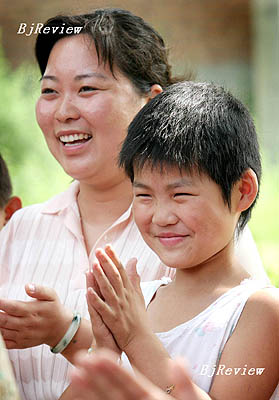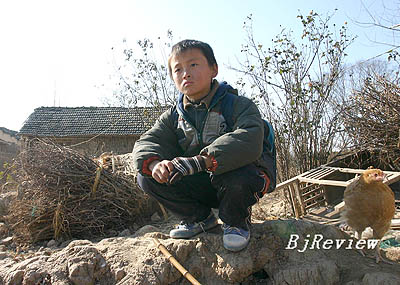|

"Ihope my parents, or at least one, comes back. I feel lonely all the time, especially at weekends and holidays," Min Songgui, an elementary school student from a village in Jiangsu Province, wrote in an essay about the hopes for 2008.
Many children in China's rural areas, whose parents leave to find work in the cities, echo Min's voice. They are known as stay-at-home children and the number of them has risen sharply in recent years.
According to a survey in 2005, there were around 58 million stay-at-home children, double that of 2000. They made up 28 percent of children living in rural areas, and in some regions, such as Sichuan, Anhui and Henan provinces, the proportion surpassed 40 percent, meaning one child out of every three was left behind by their parents. More than half of these children were of school age.
"A lack of affection from parents is the primary problem for the stay-at-home children," said Zhang Shiping, head of Stay-at-Home Children Working Panel under the State Council and member of the Secretariat of All-China Women's Federation.
In October 2006, a dozen government-related bodies, including the Office of the Rural Workers' United Conference under the State Council and All-China Women's Federation, set up a working panel. The panel is cooperating with other government bodies, including the education, public security and finance ministries, to gradually put in place laws and regulations to safeguard the rights of stay-at-home children.
According to a recent survey conducted by the working panel, 60 percent-70 percent of stay-at-home children's parents do not live in the same province as their children do, 30 percent of parents only return home once a year, and the telephone is the main method of communication between the parents and their children. And 2 percent of the parents of stay-at-home children do not have enough money to call their children regularly. Due to the long separation from their parents, some children develop psychological problems. They often find it difficult to focus on studying, feel isolated from other children, and in some cases become violent.
Many stay-at-home children live with their grandparents or relatives and some live alone. The standard of education in the countryside generally lags far behind urban areas, and the children's grandparents are mostly illiterate and unable to help them with their studies. This can cause stay-at-home children to fall behind at school.
"The lack of the guardianship and education is another problem for the children," added Zhang.

According to Zhang, more than half of the stay-at-home children have both parents working outside, and 26 percent of the children live with their grandparents. Some 27 percent of the children were just five years old or below, while some of the parents even left their children when the children were just one year old. Besides, the grandparents who look after the children are mostly undereducated, 80 percent have not even finished an elementary education. So family education is another problem for the children.
Zhang Chao is a 13-year-old boy who lives with his grandmother in a small village in Anhui Province. His parents are working in Hangzhou, the capital city of Zhejiang Province, which is 700 km away. He has to go to his neighbor's house to do his homework each day because there is no table to work at in his grandmother's house. At the neighbor's house there is another stay-at-home child living with his grandmother. The two grandmothers complain that the boys are not easy to control. "They even don't want to talk to us, but it is okay since they haven't done bad things so far," said Zhang's grandmother.
Bringing back smiles
Stay-at-home children have become an issue of public and government concern. Chinese President Hu Jintao and Premier Wen Jiabao have both visited children left behind by migrant parents, and the State Council has held meetings to study solutions to the growing problem.
Relevant bureaus are speeding up the establishment of regulations and laws to break down the barriers between urban and rural areas, said Zhang from the working panel. Specifically, according to Zhang, migrant workers and their children should enjoy equal rights in education, heathcare and social security in both cities and rural areas, and local governments should create preferential policies to encourage migrant workers to return to their hometowns.
Shantian Middle School is located in Chunkou Town, Liuyang City of Hunan Province. In March 2004, a stay-at-home boy from the school fought with others and was killed. In reaction to the incident the school surveyed its pupils and discovered that 61 percent were stay-at-home children and many were lacking guardianship and affection.
The school took immediate measures to solve the problem. They set up the Education Association for Stay-at-home Children in 2006, organizing each teacher to form a "family" unit with a group of students that could offer them extra care and help with their studies. The measure was a success and brought smiles back to the faces of many of the children. Shantian Middle School has now become a model in caring for stay-at-home children.
"Judging from the current situation, the acting parents system has had a good social effect," said Zhang, as it not only offers the children more care, but also solves practical difficulties.
Zhang said, "We will spread the success of Shantian Middle School in order that more children can benefit from it." | 